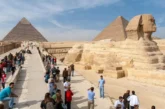.jpg)
TOURISM + CULTURE = IDENTITY, AN ESSENTIAL EQUATION
HRH Prince Sultan bin Salman bin Abdulaziz Al-Saud, Chairman of the Commission for Tourism and Antiquities of the Kingdom of Saudi Arabia, Alain St Ange, Minister of Tourism and Culture of the Seychelles & Dr Taleb Rifai, Secretary General of the UNWTO speak up through CNN’s TASK Group
Almasalla, ATP News-“Culture has a direct role in securing one s roots – it is a bond that dramatically leads to conservation, safeguarding tangible and intangible heritage” – HRH Prince Sultan bin Salman bin Abdulaziz Al-Saud, Chairman of the Commission for Tourism and Antiquities of the Kingdom of Saudi Arabia.
“Island nations depend on tourism, and tourism depends on culture.” – Alain St Ange, Minister of Tourism and Culture of the Seychelles “Culture is the storyteller of our people. Tourism is the publisher and distributor of these stories.” –
.jpg)
Dr Taleb Rifai, Secretary General of the UNWTO These, and many other powerful messages, were the threads of thought that wove together almost 900 thought and action leaders of tourism and culture from across 100 countries, including over 45 Ministers and Vice Ministers, at the world’s first ever coming together of leaders of global tourism and culture in Siem Reap, Cambodia.
This event was held at the beginning of this month at the UNWTO/UNESCO World Conference on Tourism and Culture.
Officially opening the conference, Dr Rifai could not have been more clear as to why the interdependent partnership of tourism and culture mattered, shaping identities of nations, bringing people together, especially at a time when so many issues facing the global community have the ability to push people of the world apart.
“Tourism can transform a nation through pride in culture. It shapes identity. It builds understanding. The more people can travel, the more they become part of the global dialogue.”
The challenge was put forward to all present: how do we harness the sheer force of 1 Billion strong to be able to keep the world’s over 7.3 Billion strong?
PARTNERING FOR PROMOTION, PRESERVATION, AND POSSIBILITY
Year after year, as Travel & Tourism continues to show inspiring growth, the quest to experience culture remains the pull for the majority of the world’s travellers.
Continuing with his opening address, Dr Rifai stated the importance of tourism and culture working hand in hand to uplift nations through:
1) Economic Growth – utilising the natural assets of culture – tangible (ie. icons, architecture, arts & craft) and intangible (ie. language, music, dance, traditions, cuisine) – to stimulate visitation and resulting economic activity,
2) Heritage Protection – creating not just revenues, but also consciousness, to protect priceless, prideful sites and aspects of traditional lifestyle,
And,
3) Social Development and Stability – strengthening understanding, appreciation and respect for different ways of thinking and living as prelude to supporting and celebrating communities, local and global.
Travel & Tourism, the world’s fastest growing economic sector and powerful driver of employment, earnings, competitiveness and identity, can and should play a proactive role in protecting the places and people that the world’s over 1.138 Billion (total 2014 International Arrivals) seek to discover.
Still, those seeking to protect the world’s treasures of heritage often hold concern in their hearts for the exposure of sites to influxes of curious admirers carrying cameras and travel guides.
As intuitively understandable as that may be, it is the reason that those travellers are at the site – the quest for understanding, the respect for history, the appreciation of national icons respecting national history and pride – that has the potential to turn them into the protectors of the most precious sites of our world. And the people, traditions, and creative arts that define who they are and how far they have come.
.jpg)
Ensuring that tourism can act as a platform for the promotion of culture in a way that not only celebrates the people of a place for their past, but also protects them for their future, cottage industry enterprises have become invaluable sources of connection between tourism and culture.
An exemplary enterprise with the spirit of tradition at the heart of its full-circle initiative, acting as a vehicle for rebuilding the pride and productivity of the people of Cambodia, is Artisans Angkor. Located in Siem Reap, the organisation first came to life in 1992 as a vehicle for rebuilding the lives of Cambodians through the rebuilding of skills, jobs and hope. As explained by the organisation:
Artisans Angkor is a Cambodian company which was originally created to help young rural people find work near their home village. As the offshoot of an educational project called Chantiers-Ecoles de Formation Professionnelle, aiming at providing professional skills to communities with limited educational opportunities, Artisans Angkor has maintained its commitment to education by developing its own training program.
Over the years, Artisans Angkor has become a real showcase of Khmer workmanship for its silk fabrics and garments, stone and wood carving, lacquer ware, polychrome products, silver plating and silk painting.
Not only does the company revive traditional Khmer Arts and Crafts but it also offers a collection of hand-made clothing and home furnishings fitted to contemporary lifestyles.
Artisans Angkor offers a wide range of high quality products that can suit every taste. – http://www.artisansdangkor.com .
At present Artisans Angkor stretches out across the nation with 48 village-based workshops, and of the current 1300 people employed, 900 are artisans.
This represents approximately 90% of the total number of people trained by the organisation and offered jobs, the remaining 10% going off to competitors or to pursue their own ambitions. 5% of the employees are technically classified as ‘disabled’ by society, however this business is in the business of finding the gift of enablement in all of its students and employees, which they do beautifully, finding ability in great artistry.
GIVING PERSONAL MEANING TO THE METRICS
While needing to manage the metrics of the business, it is the faces behind the numbers that matter most to its CEO, Alain Brun.
Speaking with both pride and humility, Brun stresses the responsibility felt when leading a business born out of an innate need to help and heal, educate and empower, provide technical learning and lifeskills, ultimately strengthening individuals and communities, sustainable job creation and social stability was, and remains, central to their efforts.
“I am happy to fight for the long-term. Sustainability is the most important word.”
Unique to the work of Artisans Angkor, artisan workshops are built and mobilised from community level upwards. Locations are identified within village clusters, a conscious effort being made by the business to keep families together.
So strong is the determination to strengthen social wellbeing in tandem to economic stability that kindergartens are build within the workshop grounds, making it possible for mothers to work and earn with the peace of mind if their children being cared for nearby.
The threads of the social fabric being woven by the organisation are as strong and sincere as those that go into the carefully woven silks soon to make their way across the world as precious keepsakes from Cambodia.
While all too often Tourism and Culture may seem to be sectors on the periphery of what is important to build a nation, it is actually these two sectors, as perfect partners, that provide nations with identity – past, present and future – essential to build nations beyond the bricks and mortar.
This is why billions of tourists travel to new places, seeking to meet new people, and understand new cultures that may, in fact, be thousands of years old.







